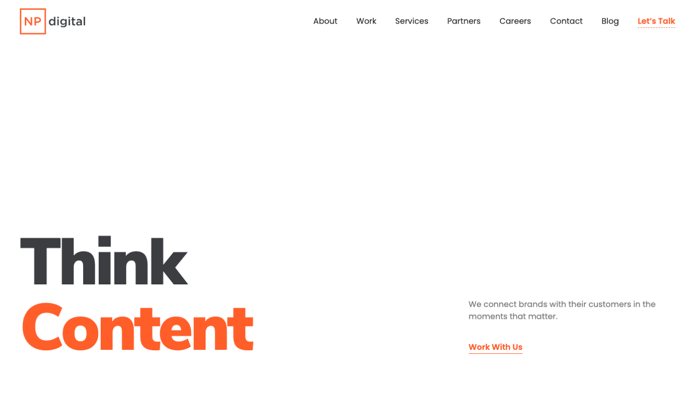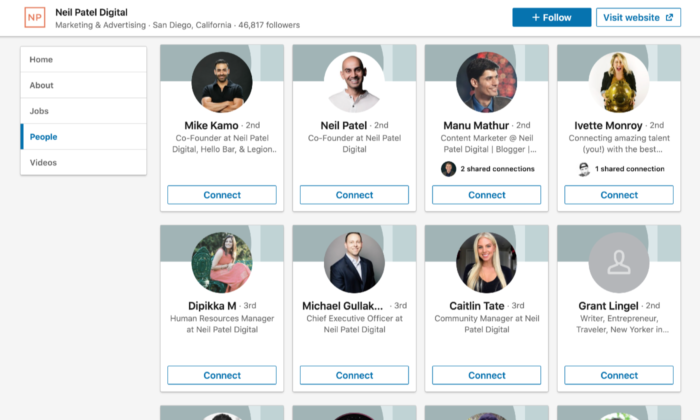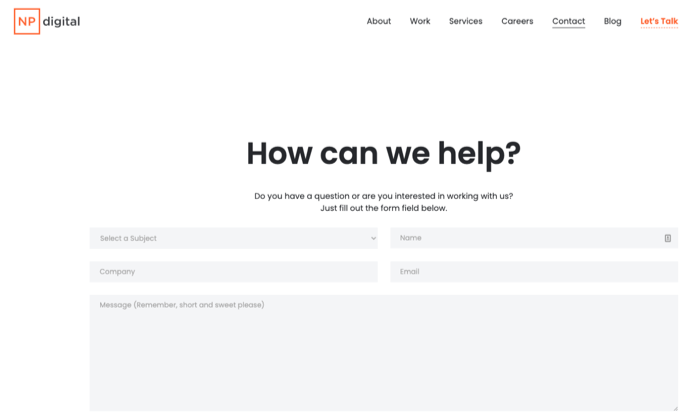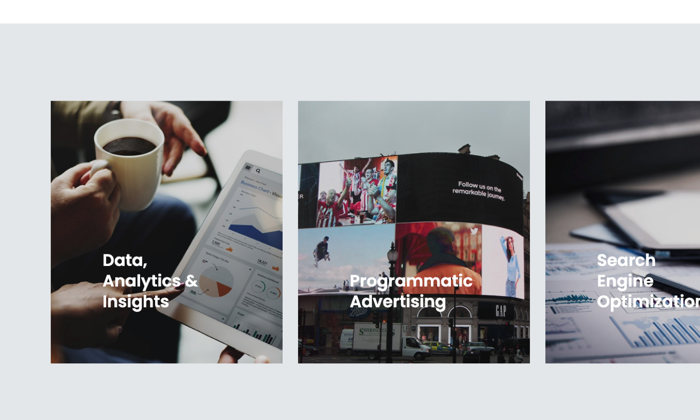email marketing google analytics

While looking through your business objectives, you suddenly feel your organization needs to shake things up a bit. Unfortunately, your in-house team doesn’t have the required expertise to push through change.
So what do you do?
Hire a consultant, hands down.
A consultant can provide your company with specialized knowledge to help solve specific problems, allowing you to gain a competitive advantage.
In a nutshell, they can give you expert opinions, analysis, and recommendations that can help ensure a more objective-based approach to grow your business and maximize sales – all at the same time.
Plus, an outsider’s perspective can likely improve strategizing and troubleshoot problems effectively too.
Our team at Neil Patel Digital has compiled the ultimate guide below to help you understand the nuances of working with a consultant for the best results.
Let’s start by reviewing how you can find the best consultant for your company.
How to Find a Good Consultant – Getting the Interviewing Process Right
Let’s face it: None of us know everything about growing and managing a business.
The scope is big, and covering every part of the syllabus isn’t possible.
Hence, it makes perfect sense to seek the counsel of experts who are right for you and your business.
And no, no one is going to judge you because you can’t solve your problems, whether it’s reducing expenses or creating an audience for new market entry.
When hiring a consultant, make sure you follow these five simple and important guidelines:
Person of the Highest Character
A good consultant must have an unimpeachable character and be a thorough professional who is willing to put the best interests of your company ahead of their own.
For instance, they must be willing to tell clients things they need to hear but may not want to – even if it means losing business. Ever ready to put their best foot forward, the expert should deeply care about helping their clients achieve their business objectives.
Experience and Expertise
The only way that a good consultant can meet challenges and identify opportunities is when they have years of experience and expertise to create effective strategies.
The consultant doesn’t need to know your company or industry niche, but they should have the relevant knowledge to understand what to do next to enhance campaign efficiency and deliver results.
Additionally, they should have applicable certifications and technical knowledge. So if you want to launch paid campaigns, find out whether the prospective consultant has the niche-specific qualification.
For instance, a Facebook ad consultant should know how to use Facebook Pixel, Facebook Ad Manager, and Power Editor. On the other hand, an AdWords consultant should be Google AdWords-certified and know how to improve ad Quality Score.
Creative Problem-Solving Skills
If there is one thing your consultant should be, it‘s an outstanding problem solver.
After all, the whole point of hiring a consultant is to solve specific pain points, along with taking advantage of opportunities.
Most of this is highly dependent on the mentality and excellent analytical skills to create and synthesize campaigns or business processes. Consultants have to be quick and effective learners and have the capability to solve problems through an imaginative and creative thought process.
Spot-On Interpersonal Skills
You need to trust your consultant if you want a successful collaboration, especially since revealing intimate details of your business is a necessity here.
Think of it as a relationship similar to that between a doctor and patient.
In the absence of complete candor, the consultant’s efforts may not be very effective, and hence, won’t help solve problems.
So make sure you choose a candidate who you feel you can develop a professional relationship of comfort and trust with.
Effective Communication Skills
Strong communication skills – oral as well as written – is mandatory for a good consultant.
An articulate thinking process and writing eloquently can also have a positive effect on your company’s target audience.
Communication is a two-way street, though.
No matter how great a consultant is, they won’t be able to help you until they fully understand the challenges you face, so make sure you’re clear about your pain points, vision, and challenges.
Remember, having the right consultant can create tremendous value. But if you get it wrong, it can also destroy value.
What to Expect When Working with a Consultant
Once you’ve chosen a consultant, there are certain expectations on both sides that you should know to ensure consultancy success.
Onboarding Process
One thing that you can expect from a responsible consultant is availability and responsiveness.
Make sure all the credentials are verified and that the necessary HR paperwork and background checks are properly performed. Once everyone is on the same page, formal documentation should be signed and delivered to the involved parties.
During onboarding, make sure you maintain open dialogue to make the process smooth and fuss-free.
Role Clarification
Everyone involved in the project or task should be clear about what is expected from them and why they’ve been hired.
You can give the consultant your company‘s mission and vision statements, along with other key documents to help them see the bigger picture.
Don’t be afraid to give the consultant measurable goals. You can work with them to set SMART goals that not only clarify all your expectations but also set parameters to measure the overall progress and performance.
Holding Discovery Sessions and Meetings
It’s almost impossible for a consultant to create any strategy for your company without having an in-depth understanding of your business objectives.
Hence, you have to be prepared to answer a lot of questions from your consultant. In fact, make sure that the consultant does clear their doubts as otherwise, the campaigns will likely fail. This includes:
- Questions about your current benchmarks, segment objectives, and overall goals.
- Questions about customer expectations and strategizing accordingly.
- Questions about KPIs and metrics for performance measurements.
- Question about tactics and various marketing channels for boosting customer engagement.
Once the consultant understands your current situation, they‘ll work out a game plan to tell you your final destination and think of ways to help you get there.
Reviewing the Final Game Plan
At this stage, the consultant will present their tailor-made ideas and strategies to suit your business needs in front of you and your employees.
This, of course, will depend on the project and the consultancy provided by them. For instance, a digital strategy consultant should cover various aspects related to advertising, such as media, public relations, digital marketing, and print advertising.
You can also propose reviews by looking at the presentation and examples from the previous clientele of the consultant.
Here’s what you can do:
- Ask for performance data for evaluation.
- Discuss campaign elements, especially priority points.
- Spot knowledge gaps and weak points in strategy, and ask for alternatives.
Strategy Implementation and Result Monitoring
Once you give the final go-ahead to the plan, the consultant will then launch the business campaign or start implementation.
After execution, the consultant should collect and analyze data to give you insights about the campaigns. You can allow suggestions made by them to enhance campaign effectiveness or adjust budgets accordingly.
You may not see immediate results, but you can still use the gained insights for crafting better campaigns.
How to Measure Success
Measuring the ROI of a consultant can be a challenging prospect. More so, because they help in several areas – many of which are measured in long-term growth.
In fact, according to the Predictive Index Consultant Report, nearly 27% of companies don’t want to hire consultants because measuring ROI is too difficult.
The first thing that you should do is approach the consultant-owner relationship with an actionable viewpoint by doing the following:
- Set specific, measurable goals from the very beginning.
- Figure out ways to measure the intangible benefits of their work.
Additionally, you can use certain metrics, such as:
- Open rate
- Click rate
- Bounce rate
- Response rate
- Unsubscribes
- Lead and conversions
- Return on ad spend (ROAS)
- Brand engagement on website by finding out the number of unique visitors, return visitors, and total time spent on the website
Make sure that you select the right KPIs that allow you to analyze your business campaigns effectively. Otherwise, you won’t be able to measure the success of the consultant’s strategy.
For measuring intangible benefits, gauge the difference in your team’s confidence before and after hiring the consultant. You can also carry out an internal survey or reference feedback.
Where to Find Consultants
We’ve already established that you need to define the problem you’re facing before hiring outside experts.
Once you’ve done that, you can get on the task of finding the right consultant for your business.
Usually, the best way to find good consultants is to use word of mouth. Talk to your past clients and ask them for references. Ask them about the problems the consultant helped solve, objectives they helped achieve, and whether they would hire them again.
The other way is to post project details on platforms like Reddit, Guru, Upwork, Freelancer.com. You can also select a freelancer profile from these marketplaces.

Another excellent way is to scan the respective consultant on LinkedIn profiles and blog posts. You can learn a lot about their personality, work ethics, and value that you may not identify while interviewing them. Twitter is also another platform to consider.
However, if you want to work with seasoned consultants – something that we highly recommend – you can do a basic Google search. Visit the websites of these companies and fill in their inquiry forms to schedule a discovery call.

Make sure you pay a lot of attention to the consultant’s personality and consulting style. It’s necessary for them to fit in with your corporate culture and gel with your team – just as any new employee should.
Do they listen to you properly? Do they have high emotional intelligence? All these are important questions you should consider before hiring.
Make sure that you do your homework on the prospect, whether a person or firm, to determine their suitability to solve your exact situation.
The worst thing you can do is force a square peg into a circular hole, which will only lead to time, energy, and money wastage. In other words, you’ll end up in the same place you started.
What Kinds of Budgets and Prices to Expect
A good consultant will always ask the budget before chalking up campaign frameworks or strategies.
Some consultants work with clients having a monthly budget of $400 for ads, while some only go for businesses with budgets greater than $3000 per month.
So you have to decide the kind of money you are ready to spend and then find candidates who have previously worked with similar budgets.
As for pricing, every consultant charges their own fee depending on their expertise, experience, and goodwill. Typically, there are three pricing models:
- Daily rate
- Project fee
- Retainer fee
Hence, you can either offer them a “set rate,“ provide an upfront retainer fee for the work the consultant will do over a specific period, or finalize an hourly rate.
Also, don’t be afraid to negotiate – even consultants expect it.
The Different Types of Consultants
A consultant often specializes in specific fields where clients need in-depth expertise. This makes them better equipped to solve particular situations by using expert tools and a greater target audience understanding to avert any crisis.
Consultants generally fall into five categories. These are:
Strategy and Management Consultants
These consultants have a market-specific understanding and know the best practices of your industry niche. As a result, they can offer the following:
- Enlarge your market footprint
- Reorganize businesses for greater efficiency and cost savings
- Expand your product offerings
- Helps make informed decisions regarding equipment purchase or company buyouts
Human Resources Consultants
These consultants work specifically on employee needs.
Whether it’s recruiting top talent, determining compensation to align with company goals, or improving employee retention, an HR consultant can streamline everything using their leadership and communication skills.
IT Consultants
IT is one area that is experiencing tremendous consulting growth.
With the rapidly increasing relevance of technology and tech support, companies have started hiring consultants to facilitate better integration and improve their computer or phone systems, upgrade servers, and ensure efficient storage space.
These consultants are also known as ICT or digital consultants that help clients with the development and application of information technology within their organization.
Operations Consultants
These are individuals or agencies that can help clients improve operations efficiency and performance.
Activities in this segment vary from advisory services to hands-on implementation support for primary functions (sales, production, marketing, etc.) and secondary functions (finance, supply chain, HR, legal, etc.). They can help to improve quality, minimize steps or mistakes, increase margins, and decrease costs.
Sales and Marketing Consultants

As one would expect, sales and marketing consultants primarily focus on the marketing and advertising aspects of organizations. They perform the following tasks:
- Work on positioning statements
- Create effective marketing plans
- Develop a brand from scratch
- Launching advertising campaigns
- Initiating sales process and suggesting improvements
- Establishing social media strategies
- Designing sales training and coaching material
Financial Advisory Consultant
These are consultants who operate in the financial advisory segment. Their main job revolves around working on questions that address financial capabilities as well as analytical capabilities within an organization.
Furthermore, every consultant can have varied profiles, ranging from M&A to risk management to real estate consultancy to tax.
Agencies vs. Consultants – What Is the Difference?
Agency and consultancy: Two words, but they are worlds apart in approach.
The main differences between these two terms ultimately boil down to the following:
Team Know-How

Agencies – whether big or small – are almost always larger than consulting firms. As a result, they have a wider range of creative talent, team members, and skillsets. You are also assured of more resources with them.
Despite the smaller size of consultancies, there is a built-in rhythm that makes them more agile when adapting to rapidly changing business landscapes. They often have specialists in specific fields that can solve pain points – provided it fits their suite of knowledge.
Also, agencies commonly implement more activities, such as advertising, digital or media plan, web designing, and so on. On the other hand, consultancies are more focused at the strategic level, which involves building brands for long-term health and commoditizing strategy execution.
Varying Budgets and Mandate Size
Any reasonable professional will always consider the overall cost to make sure it fits their budget.
This is precisely why you should decide between an agency and consultancy after determining your business size, budget, as well as the breadth of your mandate.
For instance, if you run a small operation that requires a quick turnaround time, heading consultancies will be right up your alley. But if you have more wiggle room, resources, and time, you can opt for an agency.
We would highly recommend getting roadmaps with key deliverable dates and timelines from respective partners after you finish aligning your budget and timelines. This will help you understand the overall projected costs more effectively.
Brand Vision and Time Factor
If you choose to work with creative agencies, you get the option to choose your partner based off on your vision and past campaigns. They give you hundreds of options to choose from after taking your idea to make things easier for you.
Also, since creative processes go through several rounds of conceptualizations, the turnaround time is a bit longer, but you are assured of high-quality campaigns.
Consulting firms allow clients more latitude to push their vision and opt for a more hands-on experience of collecting data and designing campaigns.
Since consultants usually try to immerse themselves wholly in their client’s team, the turnaround time is typically faster as well. That said, the size of a consultancy can increase time, in case they have a huge reserve of past work.
Offered Solutions
Agencies are popular for creating some of the most engaging, inspiring, and emotional (you can insert more positive adjectives here) brand campaigns.

While the process is definitely a little longer than working with the consultant, they do specialize in distinct areas that facilitate better strategy execution.
Consultants, on the contrary, dig deeper to solve your problems. You‘re assured of more direct and quicker solutions thanks to their hands-on approach.
Youtobe
No comments:
Post a Comment